
Min Sun, also known by his courtesy name Ziqian, was one of the most prominent disciples of Confucius. Confucius considered Min his second best disciple after Yan Hui, and commended him for his filial piety. His legend is included in the Confucian text The Twenty-four Filial Exemplars.

Ran Yong, also known by his courtesy name Zhonggong, was one of the prominent disciples of Confucius. Confucius thought highly of his excellent moral conduct, and considered him fit to be the ruler of a state. After completing school, he served as chief officer of Jisun, the noble clan that dominated the politics of Lu.

Ran Qiu, also known by his courtesy name Ziyou and as Ran You, was a leading disciple of Confucius. Among Confucius's disciples, he was the foremost in terms of ability and accomplishment in statesmanship. As a military commander of the State of Lu, he repelled an invasion from the neighbouring State of Qi. His influence in Lu facilitated the return of Confucius to his native state after fourteen years of exile.
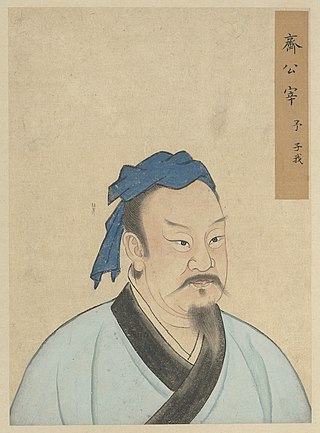
Zai Yu, also known by his courtesy name Ziwo and as Zai Wo, was a prominent disciple of Confucius, known for his gift in speech. However, Confucius severely criticized him for proposing to shorten the three-year mourning period after the death of a parent.

Zhong You, commonly known by his courtesy names Zilu and Jilu, was one of the best known and most faithful disciples of Confucius. Among Confucius's disciples, he was the second in terms of ability and accomplishment in statesmanship, after Ran Qiu. He was noted for his valour and sense of justice, but Confucius often warned him against acting without forethought. He was killed in the State of Wey in defence of his lord Kong Kui.
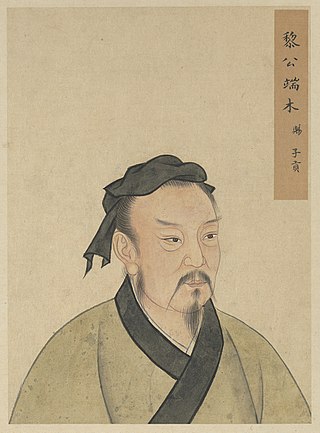
Duanmu Ci, also known by his courtesy name Zigong, was a Chinese businessman, philosopher, and politician. He was one of the most important and loyal disciples of Confucius. Among Confucius' students, he was the second best at speech, after only Zai Yu. He was a prominent diplomat of the Spring and Autumn period who served as a high official in several states, and was a very wealthy businessman.
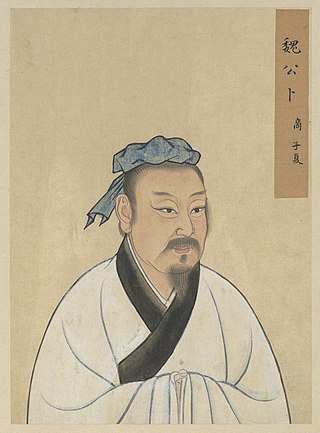
Bu Shang, commonly known by his courtesy name Zixia or as Buzi, was an ancient Chinese philosopher and a prominent disciple of Confucius who was considered one of the most accomplished in cultural learning. He was one of the five disciples who took chief responsibility for the transmission of Confucius' teachings. He played a significant role in the transmission of such classics as the Book of Poetry and the I Ching. He established his own school, and taught Marquess Wen of Wei, ruler of Wei, the most powerful state of the early Warring States period.

Yan Yan, also known by his courtesy name Ziyou and as Yan You or Yanzi, was a prominent disciple of Confucius, considered by Confucius to be his most distinguished disciple in the study of the classics. A native of the state of Wu, he was the only known southerner among Confucius' disciples.
Zhuansun Shi, commonly known by his courtesy name Zizhang, was a prominent disciple of Confucius, who accompanied Confucius in his travels abroad, and later started his own sect of Confucianism.
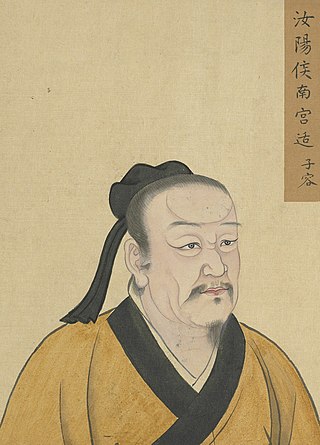
Nangong Kuo, commonly known as Nan Rong and also known by his courtesy name Zirong and as Nangong Tao, was a major disciple of Confucius. Commending Nangong Kuo as a gentleman of virtue, Confucius gave the student his niece in marriage.
Tantai Mieming or Dantai Mieming, also known by his courtesy name Ziyu, was a major disciple of Confucius. He was known for being very ugly, but was morally upright. He started his own school in the Yangtze River region, and became a major transmitter of Confucian thoughts. Confucius initially misjudged him because of his bad looks, but later expressed his regret.
Fu Buqi, also pronounced Mi Buqi, was a major disciple of Confucius. He was also known by his courtesy name Zijian. He was known as a capable governor and was also a writer.
Yuan Xian, courtesy name Zisi or Yuan Si, was a Chinese philosopher who was a major disciple of Confucius. Classic Chinese sources stated he was modest and incorruptible, and adhered strictly to the teachings of Confucius despite living in abject poverty.
Gongye Chang, courtesy name Zichang, was a major disciple and the son-in-law of Confucius. Little is known about his life, but Chinese legends attribute to him the ability to understand birds' language.
Gongxi Ai, courtesy name Jici, was a disciple of Confucius. Sima Zhen's Shiji Suoyin says his name was Gongxi Ke, citing the Kongzi Jiayu.

Zeng Dian, courtesy name Zixi, also known as Zeng Xi, was one of the earliest disciples of Confucius. He is known for a passage in the Analects in which he expressed his ambition as no more than being content with daily life. He was the father of Zeng Shen, or Master Zeng, one of the most prominent disciples of Confucius.
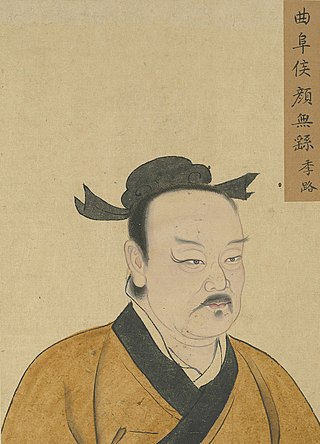
Yan Wuyou, courtesy name Lu (路), also known as Yan Lu, was a Chinese philosopher. He was one of the earliest disciples of Confucius. He was the father of Yan Hui, Confucius' favourite disciple.

Gao Chai, courtesy name Zigao, was one of the major disciples of Confucius. Confucius considered him unintelligent because he was very short and ugly, but he served capably in the governments of the states of Lu and Wey.

Qidiao Kai, courtesy name Zikai or Ziruo, was a major disciple of Confucius. He declined to take government office, but started his own school, which developed into one of the eight branches of Confucianism identified by Han Fei. His work, known as the Qidiaozi, has been lost.

Gongbo Liao, courtesy name Zizhou, was a disciple of Confucius. He was born in the State of Lu, Confucius' native state. His years of birth and death are unknown.